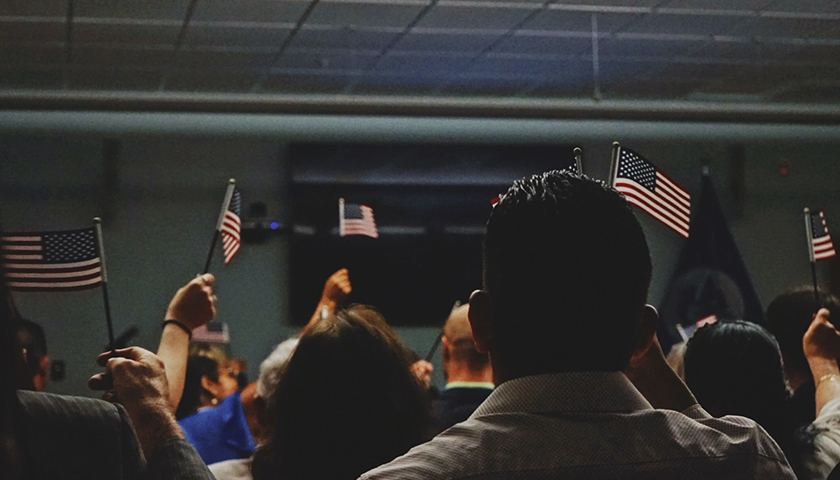by Lipton Matthews
Two mainstream think tanks have published new studies on immigration and race in America that come to the typical, safe conclusions. But a look at the data inside shows something more interesting.
A new Cato Institute report defending immigration begins by contending that immigrants are unlikely to negatively affect states’ fiscal health. But within the study’s findings, Cato may have inadvertently provided a new reason to oppose immigration.
Using state budgets as a proxy for the quality of economic institutions from 1970-2010, the authors of the Cato study assert that “a larger share of immigrants at the state level is correlated with slower state revenue and spending growth in the short-term, measured by total per capita government revenue and expenditure growth.” In other words, the more immigrants there are in a state, the less the state tends to take in in taxes and the less it spends on services. This is hardly groundbreaking; we have always known that immigration is linked to welfare chauvinism.
The message that immigration slows the growth of government may sound soothing to conservatives, but the study highlights an interesting reason for this fiscal phenomenon—that immigration undermines solidarity.
The first potential explanation is that growth in state-level taxes and outlays slows when immigration increases because the immigrants increase the ethnic and racial diversity of the states where they settle which reduces overall public political support for government spending. In other words, increased diversity reduces social solidarity to the extent that it makes voters and politicians less willing to increase government spending and taxes to supply goods and services to a more diverse population.
Indirectly, the authors undercut their argument since the narrative conveyed contradicts the case for immigration. Though immigration fails to grow the welfare state, this is likely because of anti-immigration sentiments which consequently erode political support for the financial benefits immigrants might otherwise receive. As the researchers submit, their “findings are consistent with the economic literature on how increases in diversity, whether immigrant-induced or otherwise, causes lower support for government spending and results in slower welfare and redistribution spending.”
Furthermore, the study falls short of making the case for immigration since it fails to examine the interplay between immigrant culture and the wider community of business and civic associations.
If anything, the study points to a further erosion of tolerance for immigration. Liberals and some conservatives are generally supportive of welfare. By positing that increased diversity reduces support for wealth redistribution, the Cato Institute has cultivated a novel case against immigration. Perhaps without recognizing it, Cato is saying that diversity can result in states becoming fiscally conservative, and as such we should embrace immigration.
However, the downside of this approach is that the many Americans who advocate for expanding government welfareprograms could be inspired to oppose immigration based on the erosion of solidarity found by the Cato Institute. Unknowingly, the Cato Institute has offered critics a gift to advance new objections to immigration.
The Manhattan Institute also recently released a study with unoriginal conclusions about race in America. However, the hard data in this study is also valuable since it confirms the assumption that ideology motivates views about racism in America.
For instance, eight out of 10 African Americans surveyed believe young black men are more likely to be shot to death by police than they are to die in a traffic accident. This is also true for six in 10 people in a highly educated sample of white liberals. The reality, however, is that far more young African American men die in car accidents. “Ideology, not education, influences the extent to which people are incorrect on police shootings and traffic accidents,” write the report’s authors.
In this vein, Trump voters are far less likely to succumb to false rhetoric: “Black Trump voters are almost 30 points more likely to get the question right than black Biden voters.” Whereas “conservative whites are almost 50 points more likely to get it right than liberal whites.”
Ideology also causes black people to exaggerate racist encounters, as:
Black Biden voters are twice as likely as black Trump voters to say that they personally experienced more racism under Trump than under Obama. Black Trump voters reported a consistent level of racism under both administrations. Black respondents who strongly agree that white Republicans are racist are 20-30 points more likely to say that they experience various personal forms of racism than African-Americans who strongly disagree that white Republicans are racist.
The Manhattan Institute also found that the reading of critical race theory is responsible for a diminishing of black autonomy: “Reading a passage from critical race theory author Ta-Nehisi Coates results in a significant 15-point drop in black respondents’ belief that they have control over their lives.”
The Manhattan Institute deserves praise for boldly informing skeptics that ideology manipulates perceptions of racism.
So while the Manhattan Institute authored a more useful study, both reports equip the right with ammunition to refute fables of the left. Hence, we should not hesitate to disseminate these findings, especially when the mainstream credentials of the Cato Institute and the Manhattan Institute mean they are unlikely to be censored in any meaningful way.
– – –
Lipton Matthews is a researcher, business analyst, and contributor to mises.org, The Federalist, The Imaginative Conservative, Merion West, and American Thinker.





